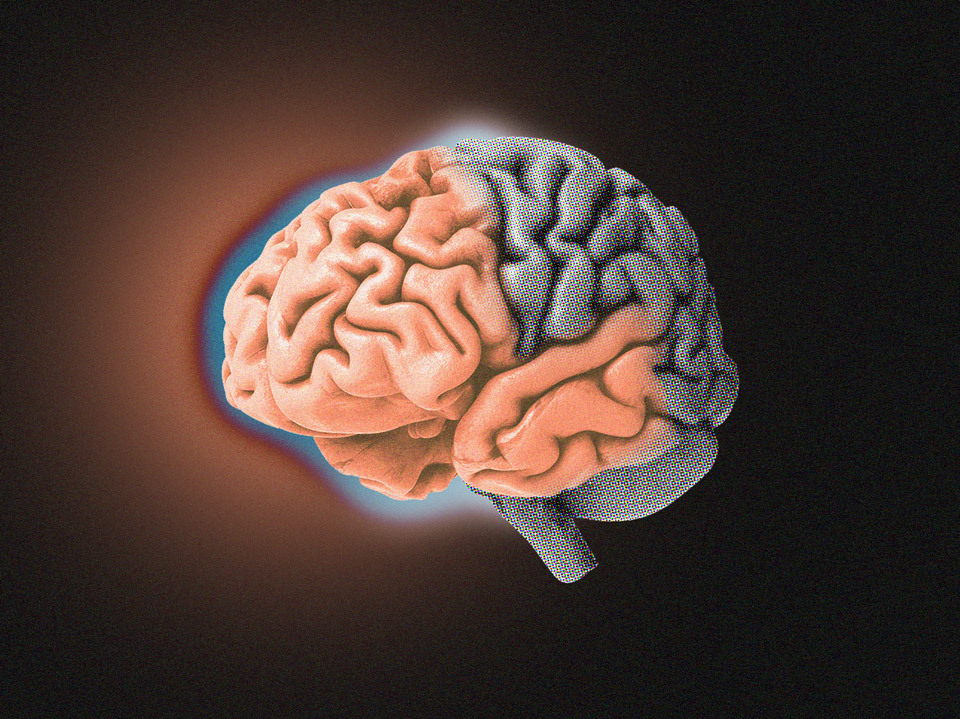How To Be There For Someone With Primary Progressive Aphasia
I've learned that presence is so much more powerful than communication.
Like many, I was saddened to hear the recent news that Wendy Williams was diagnosed with primary progressive aphasia (PPA) and frontotemporal dementia (FTD). My heart sank with familiarity. I know this diagnosis and I know the devastatingly long road that comes with it.
My father was diagnosed with PPA/FTD over 10 years ago, and my family has been navigating this new reality ever since. I’ve also become involved with the National Aphasia Association (NAA) in an effort to broaden advocacy and awareness of the disease because I know how hard it is for those who are diagnosed, their loved ones, and the broader community to understand.
When my dad was diagnosed, he was only 50 years old. He had been working as a top executive for General Motors, traveling the world, emanating hard work and success. The retirement phase of his life was not even on the horizon. The diagnosis was a shock. It was too early for something like this. He was so young and had lived an exciting, adventurous, and healthy life. When his diagnosis came, my family felt like we had more questions than answers. My dad, my mom, my brother, and I had no idea what this diagnosis meant, what it meant for his lifespan and quality of life, or how it would impact our lifestyles. My parents walked out of the doctor's office with a diagnosis but no real information to answer all of those “What now?” questions.
So, now, when I hear of the diagnosis in the news, similarly to when Bruce Willis’ FTD diagnosis was shared, I feel immense empathy. There are so many unknowns that must be swirling for that person and their community. It is a scary, unclear tunnel to be walking into. I also feel a sense of gratitude. As a celebrity, they are able to significantly raise awareness about the disease, which will hopefully have a ripple effect. This announcement is an opportunity to create more understanding and improve care for those diagnosed.
What is primary progressive aphasia and frontotemporal dementia?
The NAA describes PPA as a neurological syndrome that is caused by a neurodegenerative disease, such as Alzheimer’s disease or FTD. FTD, also sometimes called frontotemporal lobar degeneration or frontotemporal disorders, is an umbrella term for a group of rare and progressive disorders caused by nerve cell loss in specific areas of the brain, according to the National Institute on Aging (NIA).
That’s a mouthful, but what it boils down to is that PPA impacts the part of the brain that deals with communication. The ability to speak continuously declines over time, according to the NAA. And, with this type of frontotemporal disorder, many also experience decreases in memory and bodily functions as the disease progresses, according to the NIA.
A critical piece to understand, however, is that people with PPA maintain their personality. Internally, they may be able to comprehend for a longer period of time than they can communicate outwardly.
My dad initially lost the ability to read and write, followed by a loss of vocabulary. After 10 years, he has only a handful of words that he can say, which, along with some sounds, can be used to describe any number of things. He will say, “I’m going to go biking,” and that can refer to anything from “Hi, it’s nice to see you” or “I’m going to go for a walk” or “I have a problem. Can you take a look at this?”
I have to focus on his inflection, routine, and body language to understand what he is trying to communicate. I can see the emotion in his eyes when I come in the door with my sons to spend time with him. I can see in his body language when it is too cold outside or when he furrows his brow to indicate a problem. I know his daily routine and what activity might be next for him. By knowing him—the personality that I have always known—I can help care for him on this PPA journey.
How to be there for someone with primary progressive aphasia
This disease and how it impacts someone (and their support system) will look different for everyone. Never was that more apparent than when the NAA began holding regular virtual chats for people living with PPA and their caregivers. I was stunned to see dozens, sometimes even hundreds of participants sign up. There were similarities in the stories shared, but there were also different experiences, tips, stages of progression, and resources that worked for each person.
The NAA recommends strong family support and expert professional services, including speech-language pathologists. I echo that advice, but I also know how hard it can be to navigate this new normal. Here are a few lessons that have helped my family as we learned how to be there for my dad through his diagnosis.
1. Follow their lead.
When my dad was diagnosed over a decade ago, there was little information on care available to us. However, the neurologist did make a powerful statement to my mom: “Let him live in peace.” For us, that meant take him home, go slowly, and help him find comfort.
This has been our guiding principle ever since. What we have learned: Let the person with PPA/FTD take the lead in regard to their care. What activities do they prefer? How do they normally feel connected? What kind of support would make them feel comfortable? How do they find joy in the everyday?
2. Showing up matters.
I’ve learned that presence is much more powerful than communication. I may not be able to fully relay to my dad that I am sorry for what he has to go through or that I am here to help, but I can see that he brightens up when I show up. He is more aware and he tries to do simple things that he doesn’t normally do, like offer me a cup of coffee. I usually have my kids in tow, so he gets to watch their brightness, curiosity, and playfulness. My presence can be reassuring to him in navigating tricky situations too—like getting a vaccine.
I have realized just how much I can say through body language, so that is primarily the way I communicate with him now. That said, calling him on the phone is also a way to show up for him. The vocal interaction may be a bit awkward, but what is said is not what matters. What matters is that we are there and he feels a sense of love and connection.
3. Get creative when it comes to language development.
My dad has always been incredible at conducting experiments. His career as an engineer was built on testing and improving. Early on in his diagnosis, he experimented with different ways of maintaining his vocabulary. He tried language development apps and games, but he quickly preferred his own methods of note taking and mimicking words.
My family and I continue to take his cues and experiment with ways to help him too. We learn his language and nonverbal communication. Puzzles used to be his best means of brain development, so we integrated family member recognition by printing pictures of his close family members onto puzzles.
4. Maintain a routine.
My dad’s daily routine is his lifeline. It is the thing that allows him to not only extend his life but live in a way that feels comforting and supportive. He used to love biking every day. It was always a part of his life and it gave him a sense of normalcy, activity, and community. For as long as possible, we made sure that he could continue to bike safely, monitoring his bike path with phone apps and luggage trackers attached to his bike and shoes. These days, he can no longer physically go biking, but he maintains his routine by going for short walks or following his bike path in the car as my mom drives him around.
His routine also allows him to communicate when something is not right. About a year ago, he had a major shift in routine where he would not get out of bed and was not eating what he used to eat or enjoying what he used to enjoy. We understood something was significantly wrong and ended up in the emergency room to resolve a physical pain issue he was experiencing. Changes in his routine are not always an emergency, but they do help us understand his progression.
5. Above all, be empathetic and understanding.
I cannot begin to imagine how imprisoning it must feel to have thoughts inside but not be able to communicate them outwardly. The best thing I know that I can do to care for my dad is continue to respect him and love him as the dad I have always known him to be. The symptoms of the disease continue to get worse, and as it gets harder to understand him or to help navigate his new behaviors, I remind myself that what he may need most is for us to keep showing up for him and treating him with compassion.
Empathy is the message I hope to share with anyone who encounters someone with PPA—from medical providers to restaurant employees to neighbors. Even if someone is not a family member or caregiver of someone with PPA, it is helpful for any community member to know that while this person cannot communicate, they still long for connection, presence, and understanding. Patience, respect, and attention to nonverbal cues are essential in the interaction.
6. Remember to care for yourself too.
The final piece of my family’s story is the importance of self-care for caregivers. There is no easy way to say that PPA/FTD is a long and devastating disease. It is a mentally, logistically, and emotionally heavy burden, and caregiver burnout is real. Maintaining a routine and making sure that the person diagnosed lives comfortably takes incredible effort from those in the supporting role.
That caregiver also needs a chance to take breaks now and then. They need laughter and lightness. They need comfort and recognition that being sad is OK, especially on tough days. They need a sense of connection themselves. My family members and I all navigate this journey in different ways, but it is essential that we all support ourselves and our own sanity. We can show up best for my dad when our cups are full. We need support, comfort, and connection so that we can bring that light to him too.
Showing up for someone with PPA/FTD has been a profound journey. My family has learned so much since the day we found out about the diagnosis. Our journey has gone from complete unfamiliarity to a unique expertise in care, and we hold tight to the connection that we have with my dad: a special connection, even without words.
Wondermind does not provide medical advice, diagnosis, or treatment. Any information published on this website or by this brand is not intended as a replacement for medical advice. Always consult a qualified health or mental health professional with any questions or concerns about your mental health.




